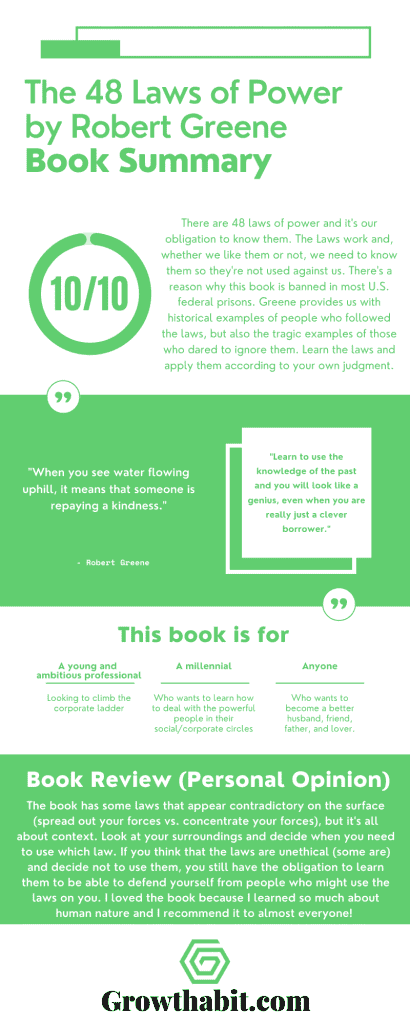There are 48 laws of power and it’s our obligation to know them. The Laws work and, whether we like them or not, we need to know them so they’re not used against us.
There’s a reason why this book is banned in most U.S. federal prisons. Greene provides us with historical examples of people who followed the laws, but also the tragic examples of those who dared to ignore them. Learn the laws and apply them according to your own judgment.
Book Title: The 48 Laws of Power
Author: Robert Greene
Date of Reading: July-August, 2018
Rating: 10/10
What Is Being Said In Detail:
The book teaches us about 48 laws of power that we need to know about. Greene structured the book in the following way:
- The stated Law
- Judgment (short description of what the law entails)
- Transgression of the law (example of people who ignored the law to their demise- bad example)
- Observance of the law (example of people who followed the law to their success- good example)
- Keys to power (how to use the laws in today’s world to achieve success)
- Reversal (when should you ignore the law for your own benefit)
Here’s a short description of every Law in the book.
Law 1—Never Outshine The Master
- Description: Help your master by pleasing and impressing, but never go too far or you’ll cause fear and insecurity in them.
- Transgression of the law: Nicolas Fouquet made a party that outshined the King’s party (Louis XIV).
- Observance of the law: Galileo honored the Medici’s by discovering Jupiter’s moons and “giving” the discovery to them
Law 2— Never Put Too Much Trust In Friends, Learn How To Use Enemies
- Description: Friends can quickly become envious. A former enemy is more loyal because they have more to prove.
- Transgression of the law: Basilius, a stable boy, become more famous than the king of Byzantium, Michael III., and then killed the king to assume his place.
- Observance of the law: Emperor Sung offered his generals riches and security.

Law 3—Conceal Your Intentions
- Description: If your enemies have no idea about your true intentions, they can’t prepare a defense for you. Do this for as long as possible so once they figure out what you want, it will be too late.
- Transgression of the law: Ninon de Lenclos, a famous courtesan, tricked the Marquis de Sevigne to ruin his chances with a countess he fell in love with
- Observance of the law: Otto Von Bismarck, who helped the Prussian King Frederick the IV avoid war with Austria only to become a prime minister and wage war against Austria just a few years later. Haile Sellasie, who tricked Balcha of Sidamo by bribing his entire army with gold and sparring his life to become the King of Ethiopia.
Law 4—Always Say Less Than Necessary
- Description: Powerful people impress and intimidate by saying less or nothing. The more you talk, the bigger the chance of saying something foolish.
- Transgression of the law: Coriolanus, a warrior whose name inspired awe, got himself condemned to death by entering politics and making an arrogant and insolent speech on election day in the forum.
- Observance of the law: Louis XIV always answered the asks and questions of his ministers with “I shall see.”
Law 5— So Much Depends On Reputation- Guard It With Your Life
- Description: Reputation is the cornerstone of your power and you need to guard it with your life.
- Transgression of the law: /
- Observance of the law: General Chuko Liang was famous for his diversion and he once sat on top of the city, opened the front gate and the enemy army of 150,000 troops didn’t attack because they taught it was a trap.
Law 6— Court Attention At All Cost
- Description: Most things are judged by appearance so make yourself stand out at all cost.
- Transgression of the law: /
- Observance of the law: P.T. Barnum gave his critics the best seats in the circus and even wrote anonymous attacks on his work just to keep himself in the newspaper
Law 7— Get Others To Do The Work For You, But Always Take The Credit
- Description: Never do yourself what others can do for you. This way, you will save time and energy, and will have the appearance of a godlike productivity machine.
- Transgression of the law: Vasco de Balboa, after many years of searching, found a rich empire in present-day Peru (the Incas). But he didn’t keep quiet about the riches of this empire and a soldier from his army got him beheaded and stole the glory— Francisco Pizzaro.
- Observance of the law: One writer “borrowed” plots, characterization, and even dialogue from Plutarch. The writer later became one of the most famous writers to ever live and many, later on, borrowed from him— William Shakespeare.

Law 8— Make Other People Come To You- Use Bait If Necessary
- Description: It’s always better to control the cards and make the enemy come to you (on “foreign soil”)
- Transgression of the law: /
- Observance of the law: Waiting for Napoleon to come to Waterloo, facing the Allied forces bankrupt and with resources exhausted.
Law 9— Win Through Your Actions, Never Through Argument
- Description: Show, don’t tell. Any win with an argument is a Pyrrhic victory, leaving only resentment and ill will with the defeated.
- Transgression of the law: Publius Crassus needed a battering ram to break the siege. He saw one on a ship and wanted the big mast, but the engineer explained endlessly that the smaller one is better. The engineer was so stubborn with this (that he was right) that he sent the smaller mast and that got him executed by the furious Crassus.
- Observance of the law: DaVinci listening to the advice of Florence’s mayor Soderini and chiseling the nose of the sculpture (he actually just sprayed dust on it and faked on chiseling it, but it had the wanted effect).
Law 10— Infection: Avoid The Unhappy And Unlucky
- Description: Emotional states are infectious and if you’re hanging out with the unhappy and unlucky, they will bring it all on you as well.
- Transgression of the law: How dancer Lola Montez ruined the lives of King Ludwing of Bavaria, Alexandre Dujarier, George Trafford Heald, and Pat Hull.
- Observance of the law: /
Law 11— Learn To Keep People Dependent On You
- Description: The more people need you and your services for their happiness, the more freedom and options you have.
- Transgression of the law: The Count of Carmagnola who dies by the hand of his employer— Venice.
- Observance of the law: Louis XI wanted to kill his astrologer (because he taught he was lying). So he asked him one day, “tell me, how long you have to live?” and prepared his soldiers to kill him. The astrologer responded, “I shall die just three days before Your Majesty.” The astrologer outlived the king for years.
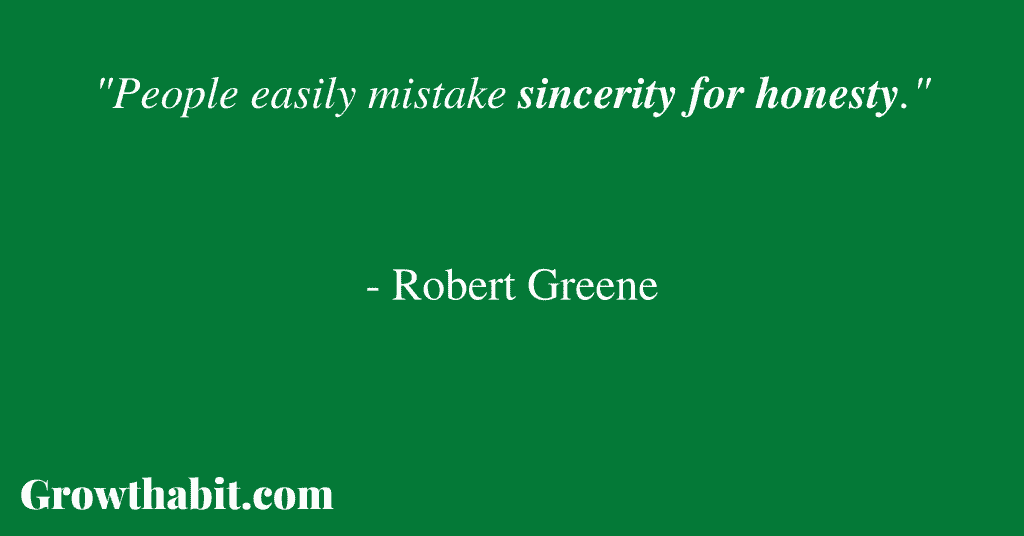
Law 12— Use Selective Honesty And Generosity To Disarm Your Victim
- Description: One sincere move will cover a dozen of dishonest ones. A timely gift like the Trojan Horse will do the same.
- Transgression of the law: /
- Observance of the law: Victor Lustig, a conman, borrowed $50,000 from Al Capone to double it in sixty days or return the initial investment. He put the money in a vault and returned Capone the $50,000 in sixty days (pretending he failed to double it). Capone gave him $5,000 because he taught he was being honest.
Law 13— When Asking For Help, Appeal To People’s Self-Interest, Never To Their Mercy Or Gratitude
- Description: If you need help from an ally, try to find a way to ask him so they will benefit from it.
- Transgression of the law: Castracani rose the ranks and became the lord of Lucca, Italy. A family that helped him rise, the Poggios, rebelled against him because seemed to forget about them when he became a lord. The oldest of Poggios managed to stop the fighting on the streets and asked for Castracini to forgive them. Castracini summoned the entire family to the palace and had them all executed in a matter of days.
- Observance of the law: Corfu and Corinth had a feud and tried to win Athenians on their side. Corinth was an old friend to Athens and named all the ways they helped them in the past. Corfu said that they would be good allies to Athens with their navy in the upcoming war against Sparta. The Athenians voted to side with Corfu overwhelmingly.
Law 14— Pose As A Friend, Work As A Spy
- Description: Pose questions to get people to reveal their plans, intentions, strengths, and weaknesses.
- Transgression of the law: /
- Observance of the law: Joseph Duveen, an art dealer, tracked Andrew Mellon for years until he learned everything about him and became Mellon’s exclusive art dealer.
Law 15— Crush Your Enemy Totally
- Description: More is lost if you stop halfway through than if you annihilate completely. Because the enemy will regroup, recover, seek revenge, and retaliate.
- Transgression of the law: Hsiang Yu left his rival Liu Pang to escape many times over and once the tides turned, Liu Pang crushed Hsiang Yu and his army to the ground.
- Observance of the law: Wu Chao became the emperor of China because she killed all of the T’and dynasty by poisoning most of them, killing the children, and exiling the remaining “opposers.”
Law 16— Use Absence To Increase Respect And Honor
- Description: If you’re already established within a group, temporarily withdraw. That will make you admired and talked about.
- Transgression of the law: Madam Guillelma de Javiac pursued and chased Sir Guillaume de Balaun and he stopped responding to her to drive her mad, but overdone it later on.
- Observance of the law: Deioces, a wise man, who the people of Medea turned to solve disputes, suddenly vanished from his people. This led to chaos in the country and they plead for him to come back, but he had his terms. Eventually, he came back but as a king of Medea, ruling for 53 years and establishing the early Persian Empire.
Law 17— Keep Others In Suspended Terror: Cultivate An Air Of Unpredictability
- Description: Predictability gives a sense of control. Be deliberately unpredictable so your enemies become off-balance.
- Transgression of the law: /
- Observance of the law: What Bobby Fischer did to Boris Spassky (massive unpredictability that made Spassky lose his mind) at their championship chess match in 1972.
Law 18— Do Not Build Fortresses To Protect Yourself- Isolation Is Dangerous
- Description: The best way to become shielded from your enemies is in the crowd. Isolation leads to a lack of information and makes you an easy target.
- Transgression of the law: Ch‘in Shih Huang, the first emperor of China, was devoid of human contact (and sight) completely in the last years of his reign. He slept in a different room every night and nobody saw him for years. He died in isolation, completely losing the grip of his vast realm.
- Observance of the law: Louis XIV built Versailles and had every notable nobleman move to the palace. Every room in the palace was connected with other rooms so it was impossible to have privacy (even for the king). But that made it perfect for Louis XIV to keep an eye on everyone who might have plotted and schemed against him.
Law 19— Know Who You’re Dealing With- Do Not Offend The Wrong Person
- Description: Choose your opponents (and victims) carefully. There are many wolves in sheep clothes and they can spend their entire lives seeking revenge.
- Transgression of the law: Muhammad, the shah of an empire spending from Turkey to Afghanistan, managed to offend Genghis Khan (three times in a row) before feeling his wrath which led to the downfall of the shah.
- Observance of the law: /
Law 20— Do Not Commit To Anyone
- Description: Do not commit to any side but your own. Your independence will make you the master of others.
- Transgression of the law: /
- Observance of the law: Queen Elizabeth I’s diplomacy of the Virgin Queen: She always gave hope, but never satisfaction, playing both France and Spain to ensure peace for her country.
Law 21— Play A Sucker To Catch A Sucker- Seem Dumber Than Your Mark
- Description: Make your enemies (or victims) feel smarter than you are. That way, they won’t suspect that you have ulterior motives.
- Transgression of the law: /
- Observance of the law: Arnold and Slack found a diamond mine and lured the U.S. financier Asbury Harpending to invest in the mine/buy the mine. He collected the richest investors in the entire country and paid them more than $700,000 ($15 million today) to sell the mine. It ended up being the biggest scam of the century, coming from two guys that looked like hayseeds.
Law 22— Use The Surrender Tactic: Transform Weakness Into Power
- Description: Don’t wait to be defeated if you’re weaker, surrender. This way, you buy time to irritate your enemy, regroup, and attack when their power vanes.
- Transgression of the law: Athens wanted the island of Melos (friend state of Sparta) to become their ally and they offered good terms to Melos. They didn’t want to ally with Athens and thought that Sparta would come to their aid if Athens attacked. After they turned down Athens’ offer multiple times, Athens attacked and burned Melos to the ground, killing all the men, and selling all women and children into slavery. Sparta didn’t come to aid.
- Observance of the law: Bertolt Brecht was charged by the U.S. Congress with writing pro-communist plays and had a hearing in front of congress. The remaining writers who were charged fought the court, while Brecht played the innocent man who respected the congress’ authority. They let him go after just an hour of questioning.
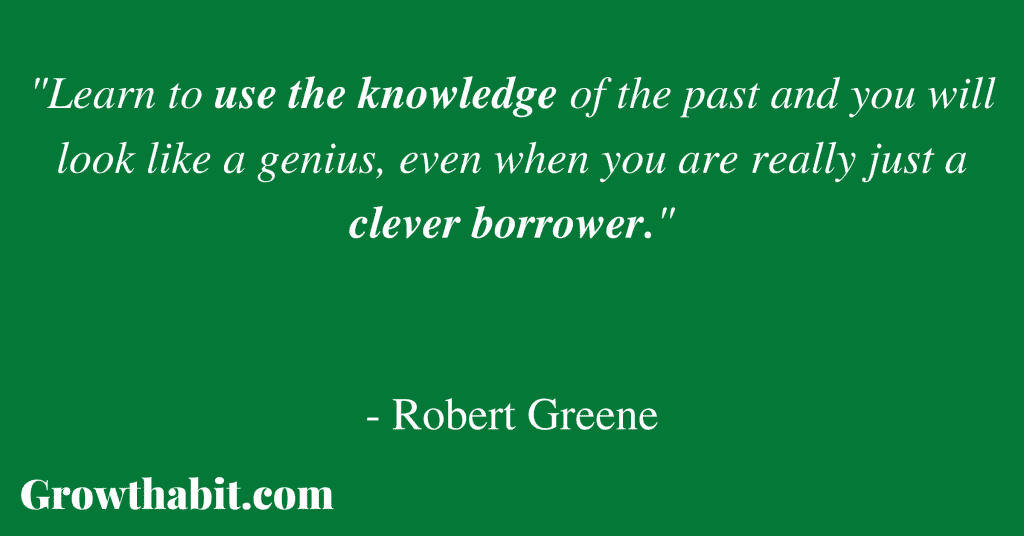
Law 23— Concentrate Your Forces
- Description: Conserve your energy by focusing on your strongest point. Intensity defeats extensity every time.
- Transgression of the law: The kingdom of Wu began attacking the neighboring kingdom in the north. The king’s chief minister, Wu Tzu-hsiu warned that they are vulnerable at the southern border and that the kingdom in the south, Yueh, noticed that. He taught that they would invade, and the king had his chief minister killed, thinking that this meant his treason and lack of support. In just four years, Yueh invaded the kingdom of Wu and conquered the country.
- Observance of the law: The Rothschild banking system started in Frankfurt and was expanded by five sons of Mayer Amschel (first Rothschild). They excluded outsiders and kept everything in the family to avoid diffusion, division, and dissension. The five brothers even went so far as to marry within the family.
Law 24— Play The Perfect Courtier
- Description: A courtier has mastered the art of indirection by flattering and asserting power over others in a graceful manner.
- Transgression of the law: Aristotle’s student, Callisthenes, went with Alexandar the Great on a major campaign. Aristotle did teach Callisthenes how to be a courtier, but he scoffed at that, thinking that Alexandar, who loved to learn, wouldn’t mind a philosopher speaking his mind. Callisthenes spoke his mind too many times and get himself beheaded.
- Observance of the law: The French architect Jules Mansart always displayed his plans to Louis XIV with one imperfection. The king would soon notice the imperfection (usually around the garden area) and propose how to make it better. Mansart did this over and over until, at the age of 30, he became the king’s main architect.
Law 25— Re-create Yourself
- Description: Become the master of your own image and never let others define your image for you.
- Transgression of the law: /
- Observance of the law: Julius Caesar organized a series of events for the public such as gladiator shows and theatrical contests. He created an image of a public showman, always playing the leading man with gusto (in battle and in showmanship).
Law 26— Keep Your Hands Clean
- Description: You must be the paragon of civility and efficiency by never tainting your hands. Use scapegoats if you need to.
- Transgression of the law: /
- Observance of the law: Imperial minister Ts‘ao Ts’ao from Han Empire once lay a siege on a city and miscalculated the timing of his supplies. The army started to murmur and mutiny was all about to rise. To prevent this, Ts‘ao Ts’ao had his chief of commissariat killed and take the blame for the problem (he did promise the chief that he will take care of his family since the man did nothing wrong).
Law 27— Play On People’s Need To Believe To Create A Cultlike Following
- Description: By keeping your words vague but full of promises and providing a focal point (you) for their faith, you can hold untold power.
- Transgression of the law:
- Observance of the law: Francesco Giuseppe Borri had a vision in 1653 and started to speak about the occult and alchemy. He soon gathered a large group of people who followed him and had to devote themselves to poverty and give his belongings to Borri. He infatuated so many people that, when the Inquisition caught him, he still received royal visitors in prison (Queen Christina of Sweden was one of them).
Law 28— Enter Action With Boldness
- Description: Doubt and hesitation are the enemies of execution. Everyone admires the bold; no one
honors the timid. - Transgression of the law: /
- Observance of the law: Victor Lustig was making a con of selling the Eiffel Tower. He acted as a government official and set the price to 250,000 francs (around $1 million today). When the buyer started to question the validity, Lusting started behaving like a real government official asking for a bribe. He got the bribe and the 250,000 francs.
Law 29— Plan All The Way To The End
- Description: When you plan all the way to the end, you can anticipate plenty of consequences along the way. Also, when you know where’s the end, you know when to stop.
- Transgression of the law: /
- Observance of the law: Bismarck pushed the German federation into war with Austria when he sensed the opportunity to establish a strong German country that isn’t under Austria’s boot. The German federation won fast, but Bismarck didn’t want to march on Vienna and take more land. In turn, they received complete autonomy from Austria. Soon enough, France started to wage war against the newly found German federation and they lost in a matter of months. Everyone was now expecting Bismarck to start conquering Europe, but he didn’t wage war ever after. His goal was a strong, safe, and secure German country and he got that without spilling any more blood.
Law 30— Make Your Accomplishments Seem Effortless
- Description: Conceal your hard work and make sure that your results appear effortless. Teach nobody your trick or they will use them against you.
- Transgression of the law: /
- Observance of the law: The great magician Harry Houdini once did a show in front of 4,000 people in London where he managed to unlock the hardest manacles one maker spent 5 years making. In the middle of the routine, he did a side-show for his audience, grabbing a pen from his belt by turning around and cutting his coat so he doesn’t get hot in the cubicle. This was followed by a massive roar and cheer from the audience.
Law 31— Control The Options: Get Others To Play With The Cards You Deal
- Description: Provide options to other people that will still keep you in control while they think they have control.
- Transgression of the law: /
- Observance of the law: Ivan the Terrible saw his enemies multiply inside and outside the country. So he moved away in the middle of the day to a small village in the south. Later, he had a letter read to the citizens explaining he abdicated because he couldn’t handle the nobility’s betrayal. Chaos ensured and people wanted him back, but he had his terms. Faced with civil war or a despotic leader, the citizens chose the despotic leader and gave Ivan the Terrible full control of everything.
Law 32— Play To People’s Fantasies
- Description: The truth is usually harsh, unpleasant, and ugly. Instead, appeal to people’s fantasies.
- Transgression of the law: /
- Observance of the law: Il Brigadino, a mysterious man for whom people thought could create gold through alchemy, tricked Venice into giving him the riches while living like a lord at their expense.
Law 33— Discover Each Man’s Thumbscrew
- Description: Every man has a hidden weakness or a small secret pleasure. Gain leverage by finding it.
- Transgression of the law: /
- Observance of the law: Cardinal Richelieu, first known as the bishop of Lucon, held a speech in front of the young king and at the end of his speech, gave kind words to the women sitting next to the young king, his mother Marie de Medici. In the following years, he kept by her side and she told the king that he is a man of trust. The king finally listened and promoted him to the prime minister. Richelieu then stopped talking to the Marie de Medici and turned his focus on the king, pushing him into a lot of trouble (wars), but at the same time making him indispensable and forming France to his vision.
Law 34— Be Royal In Your Own Fashion: Act Like A King To Be Treated Like One
- Description: The way you treat yourself will be the way other people treat you. So be careful how you treat yourself.
- Transgression of the law: The successor of Charles X was Louis-Philippe, the Duke of Orléans. But he disdained the crown and grandeur, and behaved more like a bourgeois than a king. Soon enough, the people turned against the “king” and he abdicated the throne.
- Observance of the law: Christopher Colombo fabricated the story of his noble descent so he could marry into an established Lisbon family with royal connections. Once he managed to meet the king of Portugal, he made his claims and plans for the discovery of a shorter path to Asia. The king thought of his claims as legitimate but denied him his plea. But this motivated Colombus to do the same with the Spanish queen who accepted his terms and the rest is history.
Law 35— Master The Art Of Timing
- Description: Never show that you’re in a hurry because that signals a lack of control. Learn to stand back, sense the zeitgeist, and strike when the time is right.
- Transgression of the law: /
- Observance of the law: Joseph Fouche played his role perfectly during the Revolution, then again staying with Napoleon, and later on serving under Louis XVIII. He was a master of timing and not picking sides.
Law 36— Disdain Things You Cannot Have: Ignoring Them Is The Best Revenge
- Description: The less interest you show, the more superior you might seem. Ignore small mistakes and don’t focus on enemies because that makes you weaker.
- Transgression of the law: The wild goose-chase of Pancho Villa that ended up in a disastrous mockery of the U.S. forces.
- Observance of the law: King Henry VIII completely ignoring Pope Clement’s threats of excommunication regarding his marriage with Anne Boleyn.
Law 37— Create Compelling Spectacles
- Description: Create spectacles that dazzle the people around you with beautiful imagery and lift you up in their eyes.
- Transgression of the law: /
- Observance of the law: Dr. Weisleder (“The Moon Doctor of Berlin”) performed stage healing of the people in Berlin.
Law 38— Think As You Like But Behave Like Others
- Description: Don’t make people feel inferior or they will punish you for it. Only share your real opinions with trusted friends who appreciate you for who you are.
- Transgression of the law: Spartan nobleman Pausanias conquered parts of Turkey, but became infatuated with Persian culture and started showing disdain for the Greek way of life (in public). This led to his demise and death.
- Observance of the law: Tomasso Campanella realized when he was tortured that he needs to shroud his ideas (books) in a way that conceals his true intentions so he won’t get tortured again. After getting released from prison, he wrote Atheism Conquered, a book that seemly attacked free thinkers and atheists. But the case presented in the book (in the form of a dialogue) actually had free thinkers and atheists on the better sides of the arguments and this turned the book into an “atheist bible.”

Law 39— Stir Up Waters To Catch Fish
- Description: Always stay calm and objective because that will help you achieve your goals. If you can, anger your enemies so they lose their cool and make blunders.
- Transgression of the law: Napoleon losing his composure, yelling and banishing minister Talleyrand from his office. This started the decline of Napoleon.
- Observance of the law: Haile Selassie drew out warlord Gugsa before he was ready and made him attack in a weakened state. Selassie already secured the support of the Ethiopian Church and bribed Gugsa’s allies so they don’t show in battle. He even demoralized his army by having planes drop leaflets saying Selassie is supported by everyone in the country. It was a flawless victory for Selassie, securing him the title of Emperor of Ethiopia.
Law 40— Despise The Free Lunch
- Description: What is offered for free usually has a hidden cost or an obligation. Beware of it. When you pay for something, you’re cleared of any sense of gratitude, obligation, and guilt.
- Transgression of the law: Francisco Pizzaro’s brother, Gonzalo, left Ecuador to find “El Dorado.” In two years, his expedition ended up losing 90% of all its resources and they found nothing.
- Observance of the law: Pietro Aretino, a satire writer, became a celebrity in Venice. And then he kept sending gifts to the most powerful people in the world, making himself look equal to them. This indebted these people to return him the favor once needed, later on.
Law 41— Avoid Stepping Into A Great Man’s Shoes
- Description: What comes first is always more original than what comes after. And to fill a great man’s shoes, you will need to double his achievements to make a lasting memory. Establish your name and move away from other people’s shadows.
- Transgression of the law: The rule of Louis XV who couldn’t make his own name and couldn’t match the achievements of “The Sun King.”
- Observance of the law: Alexander the Great surpassing his father Philip of Macedonia. Alexander did things his own way and made his name by conquering, ruling, and behaving in his manner, not his father’s.
Law 42— Strike The Shepherd And The Sheep Will Scatter
- Description: Neutralize the influence of a stirrer of troubles. Don’t try to negotiate with them, that will only buy them time. Banish, purge, or isolate them.
- Transgression of the law:
- Observance of the law: How Athenians ostracised those who dared to rise above the people (such as Aristides and Themistocles).
Law 43— Work On The Hearts And Minds Of Others
- Description: Don’t ignore the minds and hearts of others or they will start to hate you. Seduce others using psychology and emotions.
- Transgression of the law: Marie-Antoinette’s attitude toward her servants and people led to her demise and guillotine.
- Observance of the law: Chuko Liang defeating king Menghuo seven times (capturing and releasing him six times) so he could win his heart (and the heart of his people) over. Liang did just that.
Law 44— Disarm And Infuriate With The Mirror Effect
- Description: A mirror can seduce the enemies, thinking you have their values. When you mirror your enemies, they can’t figure out your intention and strategy.
- Transgression of the law: /
- Observance of the law: Napoleon was always put off by Fouche and even when he fired all his ministers (including Talleyrand), he never touched Fouche. He just couldn’t figure him out.
Law 45— Preach The Need For Change, But Never Reform Too Much At Once
- Description: Too much innovation always fails because people can only accept a small amount of change. So if you want to change something, do it slow and gradually.
- Transgression of the law: Thomas Cromwell wanted to break all ties England had with Catholic Church so he started doing major reforms. The people didn’t like this (nor the king who just wanted a divorce) so Cromwell’s fate became sealed after a couple of years. He was executed.
- Observance of the law: Mao preached to the people that he wasn’t a Chinese Lenin, but a modern Chuko Liang so he could connect his goal with the past the Chinese people had.
Law 46— Never Appear Too Perfect
- Description: Never appear better than other people because that will form envy and silent enemies. Admit harmless vices to appear more human and approachable.
- Transgression of the law: The story of Joe Orton and Kenneth Halliwell. Halliwell supported his lover Orton and once Orton became a successful playwright, Halliwell couldn’t handle it. Orton seemed to be so perfect and Halliwell ended up killing him and committing suicide.
- Observance of the law: The rule of Cosimo Medici who managed to topple the opposing family Albizzi and ruled Florence for thirty years, being hailed as the “wisest of all princes” (Machiavelli).
Law 47— Do Not Go Past The Mark You Aimed For; In Victory, Learn When To Stop
- Description: The most dangerous moment is the victorious moment. Don’t make more enemies than you need to. Stop when you reach your goal.
- Transgression of the law: Cyrus the Great conquered half of the world, but then he set his sight on Massagetai. And in this campaign, he made the mistake of killing the queen’s son. The queen retaliated and defeated Cyrus’s army and killed him on the field.
- Observance of the law: The way Madame de Pompadour managed to infatuate Louis XV and stay as a minister for twenty years.
Law 48— Assume Formlessness
- Description: When you have a shape, your enemies can attack you. The best way to protect yourself is to be fluid and formless.
- Transgression of the law: Sparta pushed for the status quo and always conquered with their mighty infantry. But once they conquered Athens, the money poured into Sparta and they didn’t know how to handle it. Only thirty years after they conquered Athens, they lost the battle at Thebes and collapsed, never to recover.
- Observance of the law: Mao’s army had been elusive, striking here and there with small forces, and then withdrawing. But this kind of guerilla war showed to be extremely effective against the big force of Chiang Kai-shek. Soon enough, Mao’s army conquered Manchuria and, within a year, the entirety of China.
Most Important Keywords, Sentences, Quotes:
Preface
Niccolo Machiavelli wrote, “Any man who tries to be good all the time is bound to come to ruin among the great number who are not good.”
In fact, the better you are at dealing with power, the better friend, lover, husband, wife, and person you become.
Law 1—Never Outshine The Master
All masters want to appear more brilliant than other people.
Discreet flattery is much more powerful. If you are more intelligent than your master, for example, seem the opposite: Make him appear more intelligent than you. Act naive. Make it seem that you need his expertise. Commit harmless mistakes that will not hurt you in the long run but will give you the chance to ask for his help.
Law 2— Never Put Too Much Trust In Friends, Learn How To Use Enemies
When you see water flowing uphill, it means that someone is repaying a kindness.
Men are more ready to repay an injury than a benefit, because gratitude is a burden and revenge a pleasure.
Law 3—Conceal Your Intentions
Most people are open books. They say what they feel, blurt out their opinions at every opportunity, and constantly reveal their plans and intentions. They do this for several reasons.
First, it is easy and natural to always want to talk about one’s feelings and plans for the future. It takes effort to control your tongue and monitor what you reveal.
Second, many believe that by being honest and open they are winning people’s hearts and showing their good nature.
They are greatly deluded. Honesty is actually a blunt instrument, which bloodies more than it cuts. Your honesty is likely to offend people; it is much more prudent to tailor your words, telling people what they want to hear rather than the coarse and ugly truth of what you feel or think.
More important, by being unabashedly open you make yourself so predictable and familiar that it is almost impossible to respect or fear you, and power will not accrue to a person who cannot inspire such emotions.

People easily mistake sincerity for honesty.
The paranoid and wary are often the easiest to deceive. Win their trust in one area and you have a smoke screen that blinds their view in another, letting you creep up and level them with a devastating blow.
No smoke screen, red herring, false sincerity, or any other diversionary device will succeed in concealing your intentions if you already have an established reputation for deception.
Law 4—Always Say Less Than Necessary
A person who cannot control his words shows that he cannot control himself, and is unworthy of respect.
Law 5— So Much Depends On Reputation- Guard It With Your Life
In the beginning, you must work to establish a reputation for one outstanding quality, whether generosity or honesty or cunning. This quality sets you apart and gets other people to talk about you. You then make your reputation known to as many people as possible (subtly, though; take care to build slowly, and with a firm foundation), and watch as it spreads like wildfire.
A reputation for honesty will allow you to practice all manner of deception.
Law 6— Court Attention At All Cost
“A name without fame is like fire without flame.”
Society craves larger-than-life figures, people who stand above the general mediocrity. Never be afraid, then, of the qualities that set you apart and draw attention to you.
The attention you attract must never offend or challenge the reputation of those above you—not, at any rate, if they are secure. You will seem not only paltry but desperate by comparison.
Law 7— Get Others To Do The Work For You, But Always Take The Credit
Learn to use the knowledge of the past and you will look like a genius, even when you are really just a clever borrower.
Law 8— Make Other People Come To You- Use Bait If Necessary
Why am I always having to react to events instead of directing them? The answer is simple: Your idea of power is wrong. You have mistaken aggressive action for effective action.
Manipulation is a dangerous game. Once someone suspects he is being manipulated, it becomes harder and harder to control him.
Law 9— Win Through Your Actions, Never Through Argument
You must be careful, then: Learn to demonstrate the correctness of your ideas indirectly.
The problem in trying to prove a point or gain a victory through argument is that in the end you can never be certain how it affects the people you’re arguing with: They may appear to agree with you politely, but inside they may resent you. Or perhaps something you said inadvertently even offended them—words have that insidious ability to be interpreted according to the other person’s mood and insecurities.
When caught in a lie, the more emotional and certain you appear, the less likely it seems that you are lying.
Law 10— Infection: Avoid The Unhappy And Unlucky
It would be a great thing if we could raise them up, change their patterns, but more often than not it is their patterns that end up getting inside and changing us. The reason is simple—humans are extremely susceptible to the moods, emotions, and even the ways of thinking of those with whom they spend their time.
Law 11— Learn To Keep People Dependent On You
Necessity rules the world. People rarely act unless compelled to. If you create no need for yourself, then you will be done away with at first opportunity.
Do not be one of the many who mistakenly believe that the ultimate form of power is independence. Power involves a relationship between people; you will always need others as allies, pawns, or even as weak masters who serve as your front.
Law 12— Use Selective Honesty And Generosity To Disarm Your Victim
But the soldiers, faced with a choice between another ten years of manliness, honor, and death, on the one hand and a quick victory on the other, chose the horse, which was promptly built. The trick was successful and Troy fell. One gift did more for the Greek cause than ten years of fighting.
Law 13— When Asking For Help, Appeal To People’s Self-Interest, Never To Their Mercy Or Gratitude
When Castruccio was told that it had been a terrible wrong to kill such an old friend, he replied that he had executed not an old friend but a new enemy.
What they do not realize is that even the most powerful person is locked inside needs of his own, and that if you make no appeal to his self-interest, he merely sees you as desperate or, at best, a waste of time.
Law 14— Pose As A Friend, Work As A Spy
La Rochefoucauld, who wrote, “Sincerity is found in very few men, and is often the cleverest of ruses—one is sincere in order to draw out the confidence and secrets of the other.”
Law 15— Crush Your Enemy Totally
Those who seek to achieve things should show no mercy.
To have ultimate victory, you must be ruthless.
Law 16— Use Absence To Increase Respect And Honor
Novelists J. D. Salinger and Thomas Pynchon have created cultlike followings by knowing when to disappear.
Remember: In the beginning, make yourself not scarce but omnipresent. Only what is seen, appreciated, and loved will be missed in its absence.
Law 17— Keep Others In Suspended Terro: Cultivate An Air Of Unpredictability
Chess contains the concentrated essence of life: First, because to win you have to be supremely patient and farseeing; and second, because the game is built on patterns, whole sequences of moves that have been played before and will be played again, with slight alterations, in any one match.
Law 18— Do Not Build Fortresses To Protect Yourself- Isolation Is Dangerous
The danger for most people comes when they feel threatened. In such times they tend to retreat and close ranks, to find security in a kind of fortress. In doing so, however, they come to rely for information on a smaller and smaller circle, and lose perspective on events around them.
Law 19— Know Who You’re Dealing With- Do Not Offend The Wrong Person
The highest form of the art of power is the ability to distinguish the wolves from the lambs, the foxes from the hares, the hawks from the vultures.
When you meet a swordsman, draw your sword: Do not recite poetry to one who is not a poet.
Law 20— Do Not Commit To Anyone
As your reputation for independence grows, more and more people will come to desire you, wanting to be the one who gets you to commit.
When you want to seduce a woman, Stendhal advises, court her sister first.
Law 21— Play A Sucker To Catch A Sucker- Seem Dumber Than Your Mark
Know how to make use of stupidity: The wisest man plays this card at times. There are occasions when the highest wisdom consists in appearing not to know—you must not be ignorant but capable of playing it. It is not much good being wise among fools and sane among lunatics.
He who poses as a fool is not a fool. The best way to be well-received by all is to clothe yourself in the skin of the dumbest of brutes. (Baltasar Gracián, 1601-1658)
Law 22— Use The Surrender Tactic: Transform Weakness Into Power
Weak people never give way when they ought to.
When the great lord passes, the wise peasant bows deeply and silently farts.
Inwardly you stay firm, but outwardly you bend.
For every famous martyr there are thousands more who have inspired neither a religion nor a rebellion, so that if martyrdom does sometimes grant a certain power, it does so unpredictably.
Law 23— Concentrate Your Forces
Authority: Prize intensity more than extensity. Perfection resides in quality, not quantity. Extent alone never rises above mediocrity, and it is the misfortune of men with wide general interests that while they would like to have their finger in every pie, they have one in none. Intensity gives eminence, and rises to the heroic in matters sublime. (Baltasar Gracián, 1601-1658)
Law 24— Play The Perfect Courtier
Never imagine that skill and talent are all that matter. In court the courtier’s art is more important than his talent; never spend so much time on your studies that you neglect your social skills. And the greatest skill of all is the ability to make the master look more talented than those around him.
Law 25— Re-create Yourself
The world wants to assign you a role in life. And once you accept that role you are doomed. Your power is limited to the tiny amount allotted to the role you have selected or have been forced to assume.
Law 26— Keep Your Hands Clean
I would rather betray the whole world than let the world betray me. General Ts‘ao Ts’ao, c. A.D. 155-220
In fact it is often wise to choose the most innocent victim possible as a sacrificial goat. Such people will not be powerful enough to fight you, and their naive protests may be seen as protesting too much—may be seen, in other words, as a sign of their guilt.
The truly powerful, on the other hand, seem never to be in a hurry or overburdened. While others work their fingers to the bone, they take their leisure.
Law 27— Play On People’s Need To Believe To Create A Cultlike Following
…they stumbled on a truth of human nature: The larger the group they gathered around themselves, the easier it was to deceive.
Most people’s problems have complex causes: deep-rooted neurosis, interconnected social factors, roots that go way back in time and are exceedingly hard to unravel. Few, however, have the patience to deal with this; most people want to hear that a simple solution will cure their problems. The ability to offer this kind of solution will give you great power and build you a following.
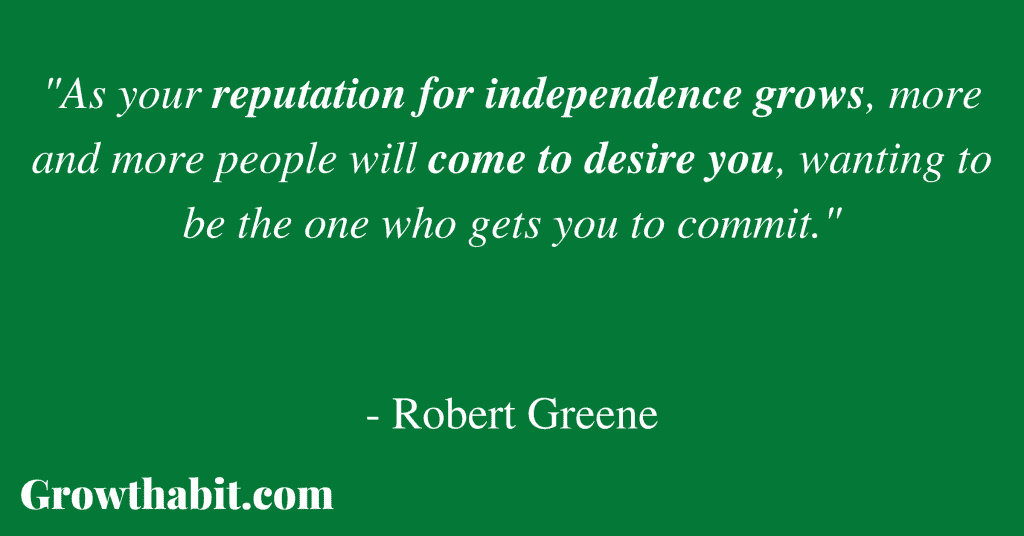
You need to amuse the bored, then, and ward off the cynics.
Our tendency to doubt, the distance that allows us to reason, is broken down when we join a group.
Law 28— Enter Action With Boldness
The path of pleasure never leads to glory!
Con artists know that the bolder the lie, the more convincing it becomes. The sheer audacity of the story makes it more credible, distracting attention from its inconsistencies.
You must practice and develop your boldness. You will often find uses for it. The best place to begin is often the delicate world of negotiation, particularly those discussions in which you are asked to set your own price. How often we put ourselves down by asking for too little.
Law 29— Plan All The Way To The End
There are very few men—and they are the exceptions—who are able to think and feel beyond the present moment. CARL VON CLAUSEWITZ, 1780-1831
Balboa became the first European to lay eyes on the Pacific Ocean.
Most men are ruled by the heart, not the head. Their plans are vague, and when they meet obstacles they improvise. But improvisation will only bring you as far as the next crisis, and is never a substitute for thinking several steps ahead and planning to the end.
So much of power is not what you do but what you do not do—the rash and foolish actions that you refrain from before they get you into trouble.
Law 30— Make Your Accomplishments Seem Effortless
Nature does not reveal its tricks, and what imitates nature by appearing effortless approximates nature’s power.
…sprezzatura, the capacity to make the difficult seem easy.
Remember: The more mystery surrounds your actions, the more awesome your power seems. You appear to be the only one who can do what you do—and the appearance of having an exclusive gift is immensely powerful.
Law 31— Control The Options: Get Others To Play With The Cards You Deal
Withdrawal and disappearance are classic ways of controlling the options. You give people a sense of how things will fall apart without you, and you offer them a “choice”: I stay away and you suffer the consequences, or I return under circumstances that I dictate.
Law 32— Play To People’s Fantasies
Never promise a gradual improvement through hard work; rather, promise the moon, the great and sudden transformation, the pot of gold.
The Reality: Change is slow and gradual. It requires hard work, a bit of luck, a fair amount of self sacrifice, and a lot of patience.
The Fantasy: A sudden transformation will bring a total change in one’s fortunes, bypassing work, luck, self-sacrifice, and time in one fantastic stroke.
Law 33— Discover Each Man’s Thumbscrew
If you suspect that someone has a particular soft spot, probe for it indirectly. If, for instance, you sense that a man has a need to be loved, openly flatter him. If he laps up your compliments, no matter how obvious, you are on the right track. Train your eye for details—how someone tips a waiter, what delights a person, the hidden messages in clothes.
Where a show of courage often conceals a man’s timidity, William’s timidity concealed his need to show courage and thump his chest.
Law 34— Be Royal In Your Own Fashion: Act Like A King To Be Treated Like One
It is within your power to set your own price. How you carry yourself reflects what you think of yourself. If you ask for little, shuffle your feet and lower your head, people will assume this reflects your character. But this behavior is not you—it is only how you have chosen to present yourself to other people.
People who wear crowns seem to feel no inner sense of the limits to what they can ask for or what they can accomplish. This too radiates outward. Limits and boundaries disappear. Use the Strategy of the Crown and you will be surprised how often it bears fruit.
Law 35— Master The Art Of Timing
When Fouché arrived in Paris to take his seat at the convention, a violent rift had broken out between the moderates and the radical Jacobins. Fouché sensed that in the long run neither side would emerge victorious. Power rarely ends up in the hands of those who start a revolution, or even of those who further it; power sticks to those who bring it to a conclusion. That was the side Fouche wanted to be on.
You do not deliberately slow time down to live longer, or to take more pleasure in the moment, but the better to play the game of power.
Law 36— Disdain Things You Cannot Have: Ignoring Them Is The Best Revenge
Remember: You choose to let things bother you. You can just as easily choose not to notice the irritating offender, to consider the matter trivial and unworthy of your interest. That is the powerful move.
Many things which seemed important [at the time] turn out to be of no account when they are ignored; and others, which seem trifling, appear formidable when you pay attention to them.
Desire often creates paradoxical effects: The more you want something, the more you chase after it, the more it eludes you. The more interest you show, the more you repel the object of your desire. This is because your interest is too strong—it makes people awkward, even fearful. Uncontrollable desire makes you seem weak, unworthy, pathetic.
Law 37— Create Compelling Spectacles
He recognized that people do not always want words, or rational explanations, or demonstrations of the powers of science; they want an immediate appeal to their emotions.
Understand: Words put you on the defensive. If you have to explain yourself your power is already in question.
Law 38— Think As You Like But Behave Like Others
Bene vixit, qui bene latuit—“He lives well who conceals himself well. ”
People who flaunt their infatuation with a different culture are expressing a disdain and contempt for their own.
You pretend to disagree with dangerous ideas, but in the course of your disagreement you give those ideas expression and exposure. You seem to conform to the prevailing orthodoxy, but those who know will understand the irony involved. You are protected.
Wise and clever people learn early on that they can display conventional behavior and mouth conventional ideas without having to believe in them. The power these people gain from blending in is that of being left alone to have the thoughts they want to have, and to express them to the people they want to express them to, without suffering isolation or ostracism.
Law 39— Stir Up Waters To Catch Fish
This is the problem with the angry response. At first it may strike fear and terror, but only in some, and as the days pass and the storm clears, other responses emerge—embarrassment and uneasiness about the shouter’s capacity for going out of control, and resentment of what has been said.
Remember: Tantrums neither intimidate nor inspire loyalty. They only create doubts and uneasiness about your power. Exposing your weakness, these stormy eruptions often herald a fall.
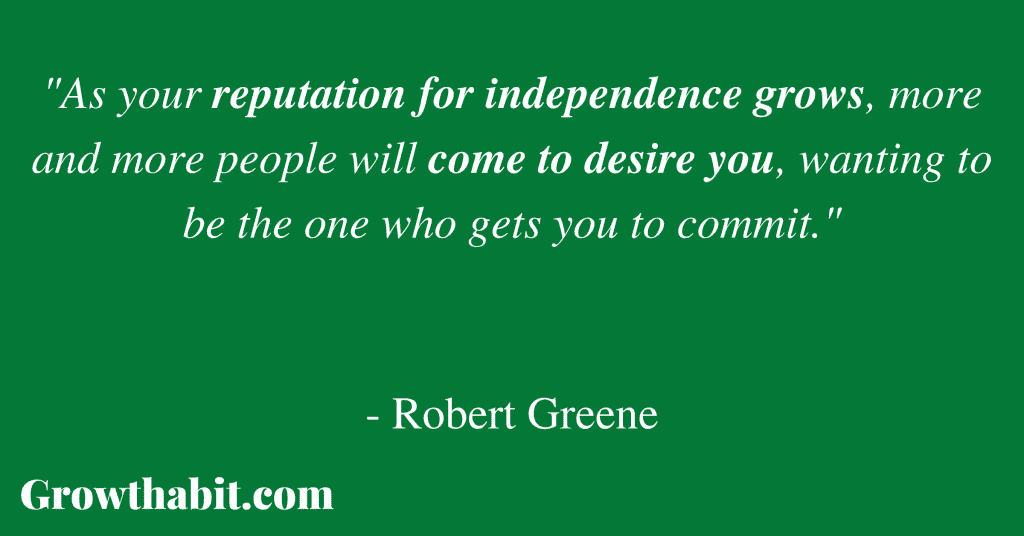
This is the essence of the Law: When the waters are still, your opponents have the time and space to plot actions that they will initiate and control. So stir the waters, force the fish to the surface, get them to act before they are ready, steal the initiative. The best way to do this is to play on uncontrollable emotions—pride, vanity, love, hate.
Nothing is as infuriating as a man who keeps his cool while others are losing theirs. If it will work to your advantage to unsettle people, affect the aristocratic, bored pose, neither mocking nor triumphant but simply indifferent. This will light their fuse.
Law 40— Despise The Free Lunch
The powerful learn early to protect their most valuable resources: independence and room to maneuver.
The Bargain Demon. Powerful people judge everything by what it costs, not just in money but in time, dignity, and peace of mind. And this is exactly what Bargain Demons cannot do.
There is a popular saying in Japan that goes “Tada yori takai mono wa nai,” meaning: “Nothing is more costly than something given free of charge.”
Sudden wealth rarely lasts, for it is built on nothing solid.
Law 41— Avoid Stepping Into A Great Man’s Shoes
But when they began to make sovereignty hereditary, the children quickly degenerated from their fathers; and, so far from trying to equal their father’s virtues, they considered that a prince had nothing else to do than to excel all the rest in idleness, indulgence, and every other variety of pleasure. Niccolo Machiavelli, 1469-1527
Be merciless with the past, then—not only with your father and his father but with your own earlier achievements. Only the weak rest on their laurels and dote on past triumphs; in the game of power there is never time to rest.
Law 42— Strike The Shepherd And The Sheep Will Scatter
When the tree falls, the monkeys scatter. Chinese saying.
One resolute person, one disobedient spirit, can turn a flock of sheep into a den of lions.
Authority: If you draw a bow, draw the strongest. If you use an arrow, use the longest. To shoot a rider, first shoot his horse. To catch a gang of bandits, first capture its leader. Just as a country has its border, so the killing of men has its limits. If the enemy’s attack can be stopped [with a blow to the head], why have any more dead and wounded than necessary? (Chinese poet Tu Fu, Tang dynasty, eighth century)
Law 43— Work On The Hearts And Minds Of Others
The men who have changed the universe have never gotten there by working on leaders, but rather by moving the masses. Working on leaders is the method of intrigue and only leads to secondary results. Working on the masses, however, is the stroke of genius that changes the face of the world. NAPOLEON BONAPARTE, 1769-1821
Governments saw men only in mass; but our men, being irregulars, were not formations, but individuals…. Our kingdoms lay in each man’s mind. Seven Pillars of Wisdom, T. E. Lawrence, 1888-1935
Be alert to both what separates them from everyone else (their individual psychology) and what they share with everyone else (their basic emotional responses).
The people who are best at appealing to people’s minds are often artists, intellectuals, and those of a more poetic nature. This is because ideas are most easily communicated through metaphors and imagery.
Law 44— Disarm And Infuriate With The Mirror Effect
You look deep into the souls of other people; fathom their inmost desires, their values, their tastes, their spirit; and you reflect it back to them, making yourself into a kind of mirror image.
Everyone is wrapped up in their own narcissistic shell. When you try to impose your own ego on them, a wall goes up, resistance is increased. By mirroring them, however, you seduce them into a kind of narcissistic rapture: They are gazing at a double of their own soul. This double is actually manufactured in its entirety by you. Once you have used the mirror to seduce them, you have great power over them.
Understand: People are locked in their own experiences. When you whine about some insensitivity on their part, they may seem to understand, but inwardly they are untouched and even more resistant. The goal of power is always to lower people’s resistance to you. For this you need tricks, and one trick is to teach them a lesson.
Law 45— Preach The Need For Change, But Never Reform Too Much At Once
Just as you cannot make people see the world your way, you cannot wrench them into the future with painful changes. They will rebel. If reform is necessary, anticipate the reaction against it and find ways to disguise the change and sweeten the poison.
It must be considered that there is nothing more difficult to carry out, nor more doubtful of success, nor more dangerous to handle, than to initiate a new order of things. Niccolo Machiavelli, 1469-1527
Change in the abstract, or superficial change, they desire, but a change that upsets core habits and routines is deeply disturbing to them.
“A new scientific truth does not triumph by convincing its opponents and making them see the light, but rather because its opponents eventually die, and a new generation grows up that is familiar with it.”
Those who finish a revolution are rarely those who start it.
Law 46— Never Appear Too Perfect
It takes great talent and skill to conceal one’s talent and skill LA ROCHEFOUCAULD, 1613-1680
Only a minority can succeed at the game of life, and that minority inevitably arouses the envy of those around them. Once success happens your way, however, the people to fear the most are those in your own circle, the friends and acquaintances you have left behind.
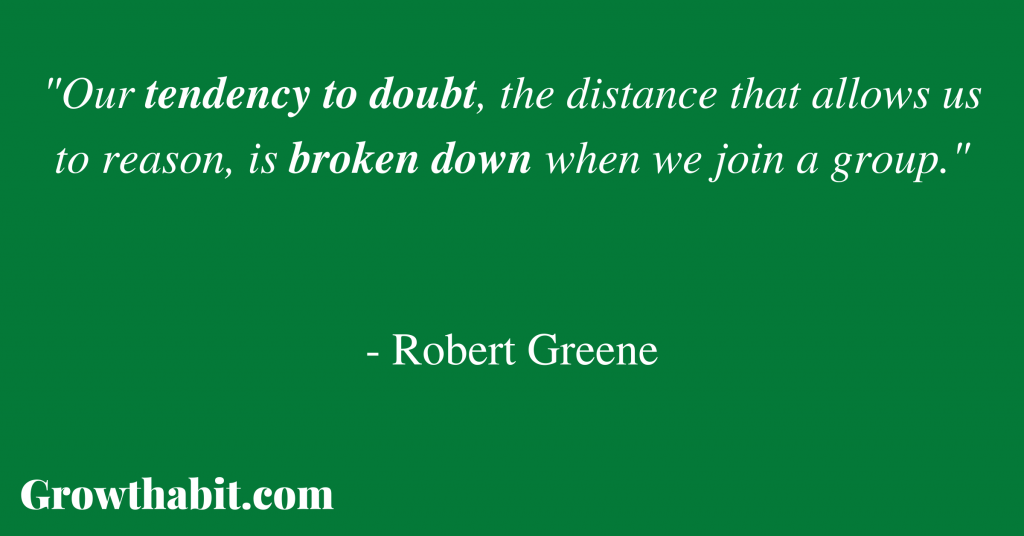
The insidious envy of the masses can actually be deflected quite easily: Appear as one of them in style and values. Make alliances with those below you, and elevate them to positions of power to secure their support in times of need.
According to the Elizabethan statesman and writer Sir Francis Bacon, the wisest policy of the powerful is to create a kind of pity for themselves, as if their responsibilities were a burden and a sacrifice. How can one envy a man who has taken on a heavy load for the public interest?
Law 47— Do Not Go Past The Mark You Aimed For; In Victory, Learn When To Stop
The greatest danger occurs at the moment of victory. Napoleon Bonaparte, 1769-1821
The essence of strategy is controlling what comes next, and the elation of victory can upset your ability to control what comes next in two ways.
Finally, the moment when you stop has great dramatic import. What comes last sticks in the mind as a kind of exclamation point. There is no better time to stop and walk away than after a victory. Keep going and you risk lessening the effect, even ending up defeated. As lawyers say of cross examination, “Always stop with a victory.”
When you beat an enemy, then, make your victory complete. Crush him into nonexis tence. In the moment of victory, you do not restrain yourself from crushing the enemy you have defeated, but rather from needlessly advancing against others. Be merciless with your enemy, but do not create new enemies by overreaching.
Law 48— Assume Formlessness
When you want to fight us, we don’t let you and you can’t find us. But when we want to fight you, we make sure that you can’t get away and we hit you squarely … and wipe you out…. The enemy advances, we retreat; the enemy camps, we harass; the enemy tires, we attack; the enemy retreats, we pursue.
Mao Tse-tung, 1893-1976
Flexible, formless rulers will be much criticized, but they will endure, and people will eventually come to identify with them, since they are as their subjects are—changing with the wind, open to circumstance.
An enemy who does not respect you will grow bold, and boldness makes even the smallest animal dangerous.
Formlessness is a tool. Never confuse it with a go-with-the-flow style, or with a religious resignation to the twists of fortune. You use formlessness, not because it creates inner harmony and peace, but because it will increase your power.
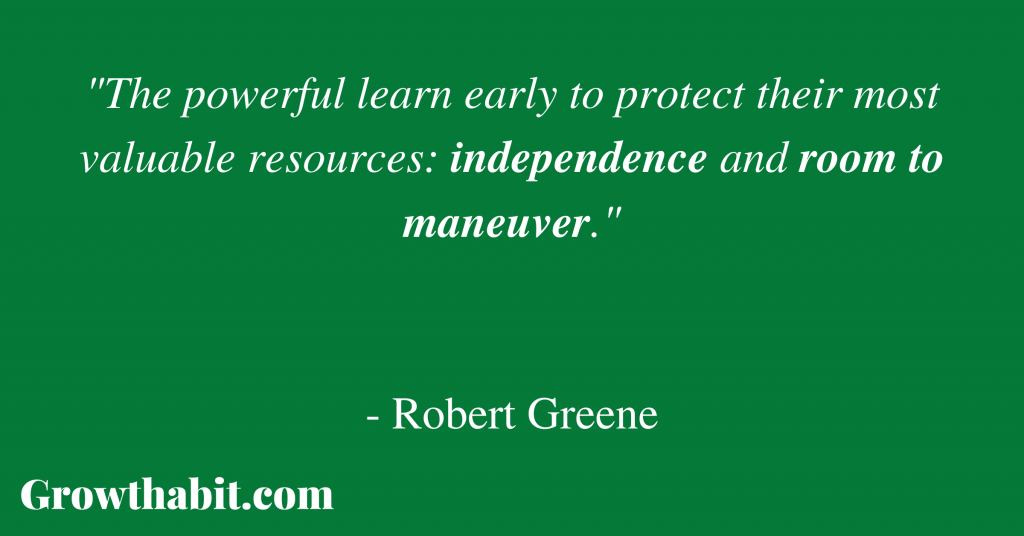
“The laws that govern circumstances are abolished by new circumstances,” Napoleon wrote, which means that it is up to you to gauge each new situation. Rely too much on other people’s ideas and you end up taking a form not of your own making. Too much respect for other people’s wisdom will make you depreciate your own. Be brutal with the past, especially your own, and have no respect for the philosophies that are foisted on you from outside.
When you assume a form and go on the attack, use concentration, speed, and power. As Mao said, “When we fight you, we make sure you can’t get away.”
Book Review (Personal Opinion):
The book has some laws that appear contradictory on the surface (spread out your forces vs. concentrate your forces), but it’s all about context. Look at your surroundings and decide when you need to use which law. If you think that the laws are unethical (some are) and decide not to use them, you still have the obligation to learn them to be able to defend yourself from people who might use the laws on you. I loved the book because I learned so much about human nature and I recommend it to almost everyone!
Rating: 10/10
This Book Is For (Recommend):
- A young and ambitious professional looking to climb the corporate ladder
- A millennial who wants to learn how to deal with the powerful people in their social/corporate circles
- Anyone who wants to become a better husband, friend, father, and lover.
If You Want To Learn More
Here’s Robert Green discussing the book.
Between The Lines
How I’ve Implemented The Ideas From The Book
There are so many different laws that I’ve applied from the book and also so many laws I realized other people were trying to implement on me. One thing I really applied in my work was “Law 13- When Asking For Help, Appeal To People’s Self-interest, Never To Their Mercy Or Gratitude.” I realized that if I want to grow my business, I need to find a win-win situation where the other person will actually get something valuable back, instead of me asking for a plea of mercy from them.
Even you reading this right now— you’re not reading this because you’re like “hey, let’s help Bruno out by supporting his work.” You want something in return (in this case, a summary of the massive “48 Laws of Power”) and there’s nothing bad in wanting something in return. I just realized that if I want to grow my business(es), I need to provide value to other people instead of relying on anything else.
One Small Actionable Step You Can Do
The reason this book is so massive is that every one of us is facing different situations, challenges, and contexts. So one small actionable step would be to read the laws above and realize which one, when implemented, will help you the most in your current life situation.
